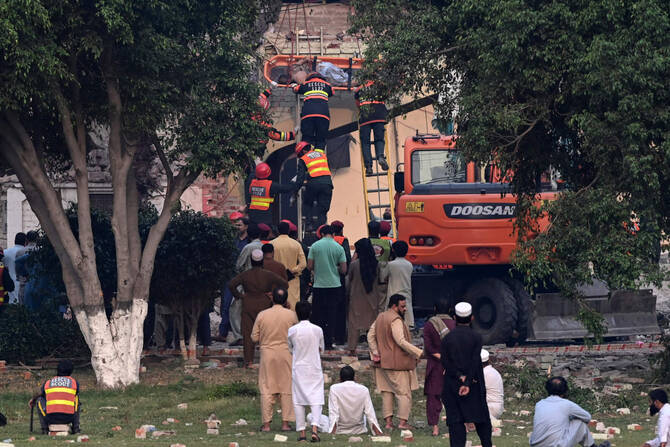Pakistan’s military spokesperson, Lt. Gen. Ahmed Sharif Chaudhry, announced Wednesday that Indian missile strikes on six sites within Pakistan killed eight civilians and injured 33 others, marking a dramatic spike in tensions between the two nuclear-armed neighbors.
The attacks follow a deadly incident in Indian-administered Kashmir last month, where 26 tourists were killed in Pahalgam. India has blamed Pakistan for orchestrating the assault, though it has yet to publicly provide evidence. Pakistan has denied any involvement, with officials suggesting for weeks that India was preparing a retaliatory response.
“Kashmir has been a flashpoint between India and Pakistan since 1947. Both nations claim it in full but rule in part and have fought two wars over it,” Chaudhry said, accusing India of “unprovoked aggression.”
“Six locations in Pakistan were hit with different types of weapons,” he stated in a televised briefing. “Eight Pakistanis were martyred, 35 are injured and two are missing.” He specified that a child, two men, and two women were killed in Ahmedpur East in Punjab, with 31 people wounded there. One death occurred in Muridke, while two teenagers were killed in Kotli in Azad Kashmir. Other targeted areas included Muzaffarabad, Sialkot, and Shakargarh, though no further casualties were reported.
India’s defense ministry confirmed the strikes under “Operation Sindoor,” saying nine locations in Pakistan and Azad Kashmir were hit. According to India, these sites were used to plan the April 22 Pahalgam attack. The Indian statement emphasized that no Pakistani military facilities were targeted.
Chaudhry condemned the attack as “cowardly,” vowing a strong response from the Pakistan Armed Forces, “with the full support of the Pakistani nation,” though he did not disclose details of that response.
Information Minister Attaullah Tarar told the BBC that Pakistan had shot down three Indian planes, while Defense Minister Khawaja Muhammad Asif claimed five had been brought down and that some Indian soldiers had been captured. These assertions remain unverified by independent sources.
Asked whether the situation could escalate, Tarar said Pakistan had proposed participating in an investigation into the Pahalgam attack, but India had instead chosen to act “without evidence” and as “the aggressor.”
The Pakistani foreign ministry said that while the Indian air force had not crossed the border, it had used standoff weapons in a way that “violated Pakistan’s sovereignty.”
Prime Minister Shehbaz Sharif has convened a National Security Committee meeting to decide Pakistan’s course of action. Meanwhile, India’s defense ministry said it would issue a detailed briefing on the strikes later.
United Nations Secretary-General António Guterres expressed deep concern, urging both nations to exercise “maximum military restraint,” warning, “The world cannot afford a military confrontation between India and Pakistan.”
At the White House, U.S. President Donald Trump responded to the news, calling it “a shame” and expressing hope that the violence would “end very quickly.”
The situation has triggered emergency measures in Pakistan. Punjab province, the most populous in the country, declared a state of emergency, shut down schools, and placed hospitals and security forces on high alert.
Pakistan International Airlines rerouted incoming flights to Karachi while grounding others. Qatar Airways announced it had temporarily suspended flights to Pakistan due to the closure of Pakistani airspace.



